

Toyota's First Year in F1
Atlas F1 Editor in Chief
Toyota's entry to Formula One was accompanied with low key promises and reserved targets from the third largest automaker in the world. But there were also high expectations from the fans and media alike. As the season nears its end, Biranit Goren sat down with Richard Cregan, Toyota's general manager of the F1 operation, to talk about the rookie mistakes, the pleasant surprises, and the controversial decisions. Exclusive for Atlas F1
The Formula One paddock layout has a way of letting any stranger, who happens to wander in, know which teams are more important than the others. Obviously, the layout of the colourful motorhomes is dictated by the position of the teams in the previous years' Constructors' Championship - but if you were a stranger who just happened to wander in, you wouldn't know about that. You'd just know that the red and silver and blue lego-like, shiny hospitality buses must belong to very important people.
With a gate at each side of the paddock, you just might think that Toyota - the first motorhome at the entry on the right-hand side - is first among equals, especially since exactly one year ago they were positioned outside the F1 shrine altogether.
"It's a strange thing," Richard Cregan - Toyota's general manager of F1 operations - says, "but the whole issue of coming into Formula One and being at the entry of the paddock was actually nice. It's like you've just come through the gate - and we've just come into the sport. So our position reflects that. And we're looking down the paddock and we're thinking - it's a long way up there to where Ferrari is."
The Corporate Identity
Toyota - the third largest motor company in the world - has seemingly made a low key entry to the sport. In setting their goals for the first full season in Formula One, Toyota F1's president Ove Andersson said last year: "I hope and I am quite sure that somehow we shall be able to qualify for the races. The target we must have for next year is to learn. We have to understand all the circuits, everything that is involved in doing Formula One. We have to try and become a team that is respected within Formula One."
"We achieved a lot more than that, didn't we," Cregan says, a flair of mischief in his eyes. "OK, so our main target for this year was to qualify for every race. But everyone wants to achieve more than that, and I believe if you look at the bigger picture, we did."
They are currently 10th equal in the Constructors' Championship standings with Arrows - with two points, collected by Mika Salo in Australia and Brazil. But the points don't reveal the full story, certainly not in a year where the top three teams have eaten up some 85% of the total points available. Rather, one can point at their qualifying averages: Salo has an average position of less than 13th - he is right there among the BAR drivers and just about near enough to Jordan's Giancarlo Fisichella. That's not an average of a team who worries about qualifying at all - it's an average of a midfield team, like those who have already been in the sport for several years.
But it's not just the results, really. Toyota F1 didn't get involved in the public debates over the escalating expenses of running a Formula One team (and how could they, being one of the richest); they didn't offer their public advise on how to improve the show (and why should they, being - still - well outside contention for the top prizes); and they didn't create much controversy on or off the track.
"When we came into the F1 paddock, we tried to be reserved and modest," Cregan explains. "And now, looking back, I quite like what we did and I wouldn't like it to change. Whatever happens to us in the future - hopefully it's success - I don't want us to become anything more in the paddock than we are now. Out there on the track - yes, we want to win. But as we move up in the paddock - which we will do, we will win the World Championship - I would sincerely hope that we don't become arrogant or we don't become stand-offish. I don't want that and I wouldn't enjoy it."
Cregan smiles when told of angry fan mail and displeased posts about this decision on Internet Bulletin Boards. "It's personal to them, isn't it," he says. "When you change your car or your engineer - these things are looked on as technical decisions which have to be made. But if you move a driver, it is perceived personal."
BG: Well, it's not very common to see teams end a driver's contract when performance is not the issue. And there's no doubt Mika performed well this year
Cregan: "Yes, Mika did perform very well. But I think you also have to take into account the driver's focus and capabilities at any given point. We said from the very beginning that we needed drivers with particular capabilities through different stages of our program. We had two drivers that were suitable for this year - our first year. But now we were faced with the decision of how to move the team forward, as we have a new car coming out in January which in some ways needs new blood to move it on. Ove [Andersson] looked at the overall situation and said, if we want to make big decisions like this, we have to do them now. And that's how it came about.
"The decision was based on where we are with the project, with the car and with the strategic plan. We felt that we probably had moved on a little bit quicker than we had planned this year - we've done better than just qualify for all races - so we moved on a little bit quicker in our plans than we expected."
BG: OK, I can understand the logic of this if you had picked up a new, upcoming talent for a long term deal, like McLaren had done with Kimi Raikkonen. But instead, you replaced Mika Salo with another veteran driver, Olivier Panis. That baffles me. How is Panis better than Salo?
Cregan: "Well, we've taken Panis because he is renowned for his testing ability, in particular in the area of engine development - and that's what we wanted to have, that's what we need right now.
"Look, our ultimate target is to be able to challenge for the World Championship, so we have to make sure that at each stage we've got the drivers, the engineers, and the machinery to do the job. And each part of that jigsaw may have to be changed at any time. We always said, from the very beginning, that Toyota's F1 project is bigger than any person involved in it, so at any time it may be necessary to move one or more people.
"I know for a fact that it wasn't an easy decision for Ove to make [to let Salo go]. But Ove based the decision on what he needed to do for the project. He didn't make an emotional decision, he made one based on logic, information. These are big decisions which Ove has to make and has made now, and I believe they were the right decision. I think that it will show next year that we've moved on to the next phase."
Cregan: "That's absolutely true. But I think on top of that it also proved beyond reasonable doubt that we have a team chief who is more than capable to achieve the job and he can make whatever decisions are necessary for the project to succeed. And some of those unfortunately are seen as quite harsh or inhuman or whatever people will look at them, you know, but they're necessary to be made."
BG: Interestingly enough, it was also the absolute opposite of Ove Andersson's decision last year to keep his promise to Allan McNish and let him race for you in F1 despite his inexperience. Back then, the decision seemed emotional, rather anti-corporate.
Cregan: "Yes, yes. Absolutely. But again, that just proves what I said - Ove will know how to make the right decision at any given scenario. Ove is a very loyal person and he expects loyalty in return. And if he tells you he's going to do something, he will. Allan gave us fantastic service in the Le Mans project and a fantastic service in testing. So he got his year in Formula One, Ove fulfilled that promise he made - that he would get a year in F1. It gave Allan his break into the series; if he stays in it or not, I don't know."
BG: So there are no hard feelings with your drivers?
Cregan: "It was a professional decision, not a personal one, and both sides understand that. Of course, there's bound to be some animosity about decisions like that, but in general I think it's understood in the team that it was a professional decision."
Looks Like They Made It
Cregan came into Formula One after almost two decades of experience in Rally, and he'll be the first to admit Formula One was his ambition and dream. "To me, it's an opportunity to succeed in what is the pinnacle of motorsport - and Formula One is the pinnacle of motorsport, you can't deny that," he says.
BG: So when did it sink in, that you're here - that you've made it to Formula One?
Cregan smiles. "I still remember getting into the paddock in Melbourne, for the first race," he says eventually. "When I first stood out in the pitlane, on the pit wall, and looked back at the garage and saw over the garage 'Toyota and our drivers' names, it was a very emotional moment - I can still feel it now. I remember calling my wife and saying, 'we're here, we've arrived'."
Yes, Toyota certainly made it to Formula One, and perhaps the biggest surprise about their entry was the car's reliability: each driver had five mechanical retirements so far this year. In comparison, McLaren's Kimi Raikkonen had seven and Renault's Jarno Trulli had four. In other words: they weren't far off the average reliability of a Formula One team, and certainly better off than one would expect a brand new team.
"We've been very pleased with the reliability," Cregan confirms. "I firmly believe that when you have good reliability, you can build on that. I think if you have a very high performing car, trying to build reliability into it is very difficult, so I think in the way we are - it's easier. I think it's easier to build competitiveness into reliability than the other way around."
BG: Were there things you did this year that you now look back on and say, this was a rookie mistake?
Cregan: "Oh yes, for sure. A lot of things. For example, the set-up of the car and how we use our weekends. You got your Friday, Saturday and Sunday which are very limited, so you have to learn to really use that time in the best possible way, and on many occasions we didn't use it properly. The other big area where we improved drastically is pitstops. Practice and training and approach. Especially in the last couple of events, we really got that right, and we're happy with that.
"Also, I think we sometimes concentrated on minute details too much. It would be fine if you are up there in the top five and you're trying to climb up - then you really need to dig deeper. But at the moment, while we need to realise the details, we also have to make the big changes. So that's another area where we didn't really hit the nail on the head.
BG: In contrast, what was the high point?
Cregan: "The high point? I think mine, personally, was probably at Spa. We were fighting for a point - in the end we didn't get it - but we were fighting for a point, and we brought two cars home in the top ten. Spa is a difficult circuit, so to actually finish the race there with two cars was special for me, personally."
Over a year ago, while Toyota was running extensive tests around F1 circuits and marketing their entry to the sport from a modest motorhome outside the paddock fence, Cregan told Atlas F1: "At the moment with the engine, I believe we are more on schedule than we are with the chassis. The engine is going very well. Chassis - we still have a lot of work to do."
BG: One year later, that still seems to be true...
Cregan laughs. "Unfortunately, yes," he says. "We started off with a very strong engine package and with a chassis package that we felt had potential. One of the issues was that Gustav Brunner [the team's technical director, who joined the team last year from Minardi] had a very limited amount of time to do the chassis when he came, so this was one restricting factor. He always intended that he would do an interim car for this year and then concentrate on a car for 2003, and that's exactly what he did.
"But the big issue we had all through the year was that we ran out of potential, really, with the interim car. We weren't able to improve it like we originally thought we could. The engine was obviously a very good base, like we thought, and we were able to improve it almost every race - either in terms of driveability or horsepower or whatever.
"With the chassis we have struggled, we definitely have struggled with it this year. And we have come to the conclusion in the last couple of races that we really have to understand the chassis better and understand the problems we had, so that we don't incorporate them in next year's car. In the last two races, we started to understand where our problems are coming from. So we're just hoping now that next year's car will be starting from a completely new base."
BG: The general assumption in F1 is that you have the third-best engine. Considering your inability to match the engine with a chassis, wouldn't you have been better off becoming an engine supplier than...
Cregan: "No!"
BG: ... a full-car team?
Cregan: "Definitely not. We're more convinced of this now than ever. When you supply an engine to another team, you hand over, to a large extent, control of your success to someone else. We're successful as a team, as Toyota F1, not successful as Toyota-Jordan, or McLaren-Toyota. This is it, all the credit goes to us, and this is what we wanted. And we're 100% assured now that this is the way we wanted. We're in control - which is what we wanted to be and need to be."
BG: You've been given a lot of slack from the media and fans this year. Next year is not going to be like that, you know.
Cregan: "Yes, the honeymoon is over, I know that. Now it's the real life that is going to hit us in the face. Now the real work begins and we're going to have to perform. We are Toyota, we have a big team in place, everything is there. Now we just have to deliver."
If there was one sour grape in Toyota's entry to Formula One, it was Gustav Brunner's move from Minardi to the newly formed team last year.
Well over a year later, Toyota and Minardi are neighbours in the paddock and each team has nothing but kind words to offer the other.
"Oh, I have no beef with them now - we've got a good relationship," Stoddart sums it up, while Cregan concurs: "we certainly became friends with Minardi this year and I have to tell you: there is a lot of admiration on our part for Minardi and Paul.
"You know, when you do a year in F1 you realize how difficult it is. F1 is difficult. We have a good budget, there's no question about that, but you realize how difficult it is - it's not just about money. It's about how you mix the ingredients of money and people and technology and management. All of that. So when you're in the position we are in, and you look at Minardi and you see what they're achieving with their limited resources, you cannot but admire them.
"We have seen the passion that Paul and his team has for F1. When you see the personal commitment that that man has made for his team, to keep it afloat, you just have to admire him. You cannot ignore it."
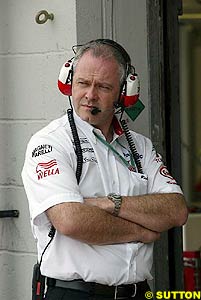 In the Monza paddock, though, it really depends on which side you've entered through.
In the Monza paddock, though, it really depends on which side you've entered through.
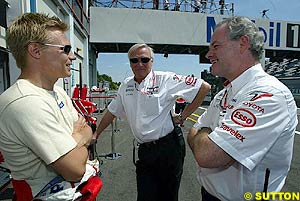 Being in Formula One, though, one can seldom avoid controversy altogether. Toyota managed to avoid it last year, after they agreed to stop testing along with all other teams on November 2001. And just when it seemed they'd manage to avoid it all through this year as well, the team announced they will be ending Salo's contract one year prematurely - to the disapproval of the fans.
Being in Formula One, though, one can seldom avoid controversy altogether. Toyota managed to avoid it last year, after they agreed to stop testing along with all other teams on November 2001. And just when it seemed they'd manage to avoid it all through this year as well, the team announced they will be ending Salo's contract one year prematurely - to the disapproval of the fans.
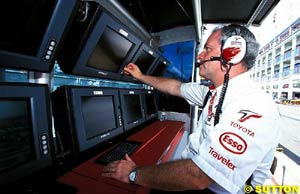 BG: You know, it's the first decision made to remind the fans that Toyota is a corporation after all. You let us forget this year that you were the third largest automaker, we thought of you as this really nice and modest new team. And that was the first decision that reminded us that you have a board to answer to and that results are demanded.
BG: You know, it's the first decision made to remind the fans that Toyota is a corporation after all. You let us forget this year that you were the third largest automaker, we thought of you as this really nice and modest new team. And that was the first decision that reminded us that you have a board to answer to and that results are demanded.
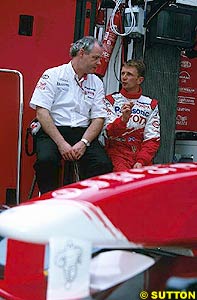 "Overall, if you look at the whole of the season, we started off probably in a bit of a fairy tale - we got some points in the beginning of the year [in Australia and Brazil] and it was great, no questions about that. But the feet came back on the ground after about four races and we realised that the competition was moving forward at a much greater pace than we were, and we couldn't keep up. So we knew that we weren't using our resources properly. Because we have a lot of resources and a lot of possibilities, and we weren't able to keep up. So this is something that we probably realised after four races."
"Overall, if you look at the whole of the season, we started off probably in a bit of a fairy tale - we got some points in the beginning of the year [in Australia and Brazil] and it was great, no questions about that. But the feet came back on the ground after about four races and we realised that the competition was moving forward at a much greater pace than we were, and we couldn't keep up. So we knew that we weren't using our resources properly. Because we have a lot of resources and a lot of possibilities, and we weren't able to keep up. So this is something that we probably realised after four races."
Sidebar: Admiration for Minardi
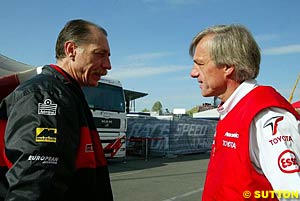 Brunner, a highly acclaimed and vastly experienced designer, let Minardi's new owner Paul Stoddart know by fax that he had accepted an offer from Toyota and would leave Minardi effective immediately. Stoddart was fuming. "That showed me the darker side of Formula One," he told Atlas F1 back then. "I mean, the kind of dirty business like that, which I would rather not be involved in."
Brunner, a highly acclaimed and vastly experienced designer, let Minardi's new owner Paul Stoddart know by fax that he had accepted an offer from Toyota and would leave Minardi effective immediately. Stoddart was fuming. "That showed me the darker side of Formula One," he told Atlas F1 back then. "I mean, the kind of dirty business like that, which I would rather not be involved in."
Please Contact Us for permission to republish this or any other material from Atlas F1.
|
Volume 8, Issue 38
Atlas F1 Exclusive
Interview with Richard Cregan
Articles
On the Right Track
Monza Madness
Ann Bradsaw: View from the Paddock
Italian GP Review
Italian GP Review
Italian GP - Technical Review
31 Years Ago...
Open Letter to Fujio Cho
Stats Center
Qualifying Differentials
SuperStats
Charts Center
Columns
Season Strokes
Elsewhere in Racing
The Grapevine
> Homepage |